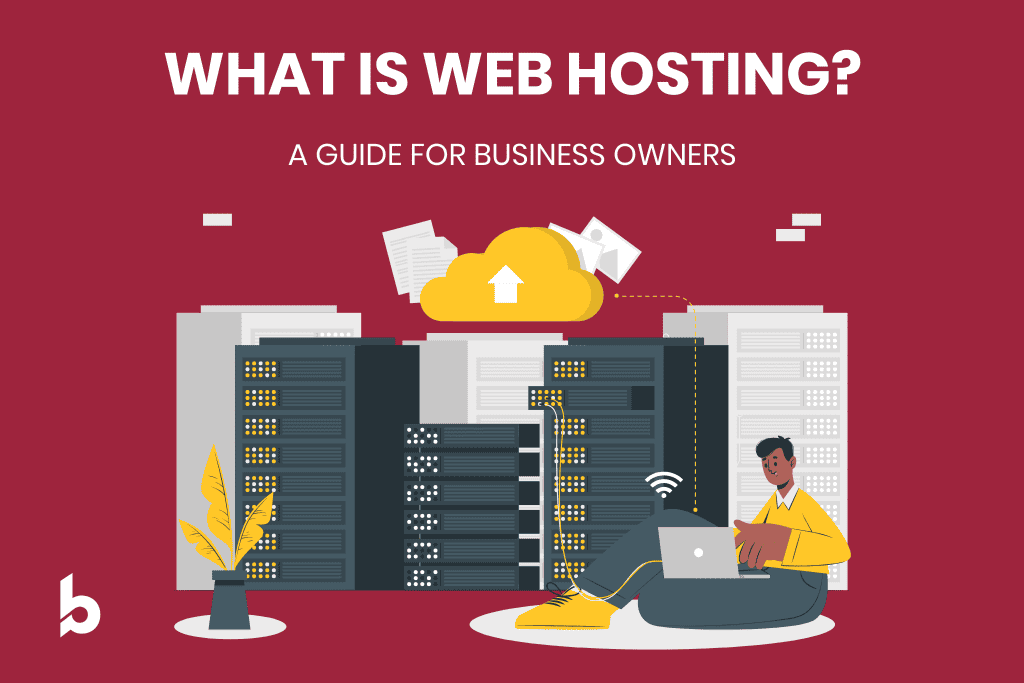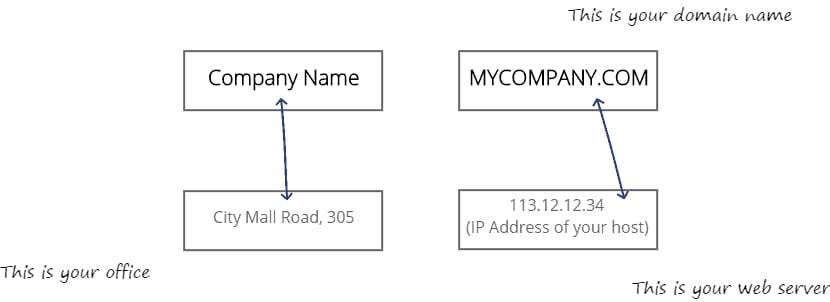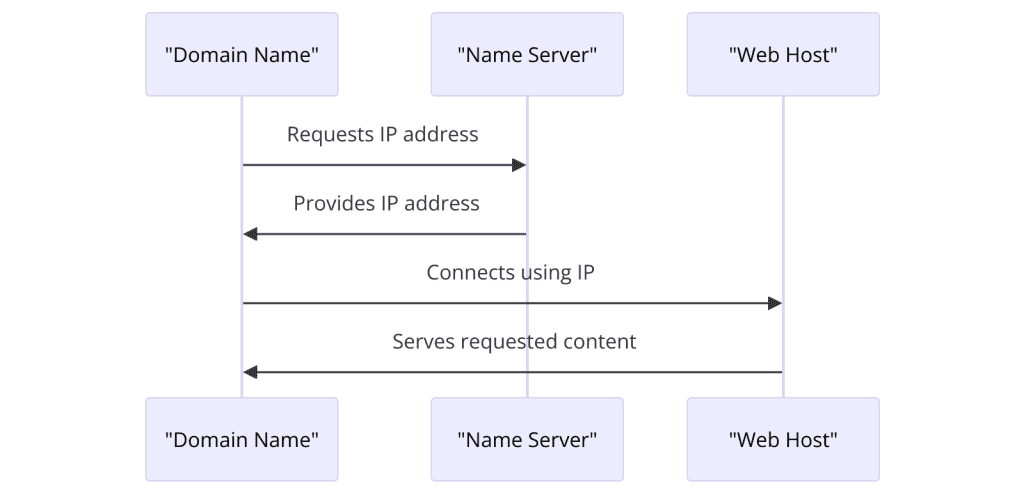What is Web Hosting? A Guide for Business Owners
Find out the difference between domain registrars and web hosting providers. See how both are important for starting your website and keeping it running smoothly online.

Explaining Web Host, Domain Name and Name Server
For many business owners, the terms “web hosting” and “domain registration” can seem like complex, technical jargon. However, understanding these concepts is crucial for establishing and maintaining a strong online presence.
Let’s break down the concept of web hosting in simpler terms, drawing parallels to something more familiar: setting up a physical business.

Web Host
A web host is the actual place (a server) where all your web files are stored for people to access through the World Wide Web.
Domain Name
A domain name is the digital address that customers use to find your online store. It’s a unique name that visitors enter into their web browser, like “www.yourbusinessname.com”. Just as you’d register a business name, you need to register your domain name to ensure it’s exclusively yours.
Name Servers
Name servers are specialized servers on the internet that play a crucial role in translating domain names into IP addresses (typically the web hosts), which are numerical labels assigned to devices connected to a network.
The Relationship Between A Web Host and a Domain Name
To make a website visible online, you need both a domain name and web hosting. The domain name serves as the address that directs users to your website, while the hosting provides the physical space (server) where your website’s content is stored. After registering a domain name, you will use the domain registrar’s name server to point your domain to your web hosting provider’s server using DNS settings.

Feature | Web Hosting | Domain Name | Name Servers |
|---|---|---|---|
Main Function | Hosting your website’s content online. | Acquiring a unique domain name for your website. | Directing your domain to the hosted website content. |
Notable Providers | Bluehost, SiteGround | Namecheap, GoDaddy | Cloudflare, Google DNS, Domain Registrars |

Many vendors offer both domain registration and web hosting
Most vendors like GoDaddy or SiteGround now offers both domain registrar and web hosting services. Just be clear, these are 2 distinct functions even though they are provided by the same company.
Different Types of Web Server
Hosting Type | Description | Benefits | Typical Use Case |
|---|---|---|---|
Shared Hosting | Multiple websites hosted on a single server. | Cost-effective, easy to use. | Small websites, blogs. |
VPS Hosting | Virtual private server offering more control and resources. | More resources than shared, more control. | Growing websites needing flexibility. |
Cloud Hosting | Resources spread across multiple servers. | Highly scalable, reliable. | Websites with fluctuating traffic. |
Dedicated Hosting | A single server dedicated to one client. | Maximum control, security, and resources. | Large businesses, high traffic sites. |
There are mainly four types of web server hosting options available for websites today: shared, Virtual Private Server (VPS), dedicated, and cloud hosting. Each type offers different levels of performance, security, and flexibility to cater to the diverse needs of websites ranging from small personal blogs to large corporate platforms. Choosing the right hosting environment is crucial for ensuring your website operates smoothly, remains secure, and can scale as your business grows.
Shared Hosting
Shared hosting is the most basic and cost-effective option, ideal for small websites and beginners. With shared hosting, your website shares a single server’s resources, such as CPU, RAM, and disk space, with other websites. This can be a great starting point due to its affordability and simplicity, but it may lead to performance issues if other sites on the server experience high traffic or if your site grows beyond the server’s capacity.
Virtual Private Server (VPS) Hosting
VPS hosting offers a middle ground between shared and dedicated hosting. Although your site still shares a server with other websites, it operates within a virtualized environment that allocates specific portions of the server’s resources to your site. This setup provides more control and dedicated resources, reducing the risk of performance issues related to other sites on the server. VPS hosting is suitable for businesses expecting moderate traffic or developers needing a customizable hosting environment.
Dedicated Hosting
Dedicated hosting provides a server solely for your website, offering maximum control, performance, and security. With dedicated hosting, you’re not sharing resources with any other websites, which means you have the entire server’s capacity at your disposal. This type of hosting is ideal for large businesses or websites with high traffic volumes, requiring extensive customization and control over their hosting environment. However, it’s also the most expensive option and requires technical knowledge to manage and configure the server.
Cloud Hosting
Cloud hosting represents a shift from traditional hosting models, utilizing a network of virtual servers that store your data across multiple physical servers. The main advantage of cloud hosting is its scalability and reliability; you can easily scale your resources up or down based on traffic, and if one server in the cloud network fails, another can take over, ensuring your website remains online. This type of hosting is suitable for businesses with fluctuating traffic patterns or those looking for high availability and scalability options.
Selecting the Backbone of Your Online Presence
The next critical step in establishing your online presence is to choose a reputable domain registrar and a reliable web hosting service. These foundational elements ensure the stability, security, and performance of your website. By selecting the right partners, you set yourself up for success in navigating the digital landscape and achieving your online goals efficiently.
Frequently Asked Questions
What are Nameservers?
Name servers are specialized servers on the internet that play a crucial role in translating domain names into IP addresses, which are numerical labels assigned to devices connected to a network. Whenever you type a website’s domain name into your browser, name servers direct your request to the correct server where the website’s files are stored. This process, known as DNS (Domain Name System) lookup, allows you to access websites by typing easy-to-remember domain names instead of complex numerical IP addresses. Essentially, name servers act as the internet’s phonebook, enabling the seamless finding and connecting to websites worldwide.
In short, name servers are like the internet’s address book, helping turn website names into addresses computers can understand.
Most domain registrars offer name servers, allowing you to connect your domain to the internet, but you can also use your web host’s name servers or services like Cloudflare for this purpose.
What is the difference between Web Hosting and Email Hosting?
Email hosting and web hosting are two different services that cater to distinct aspects of your online presence.
Web Hosting is a service that allows you to publish your website on the internet. It provides the technology and server space required for your website to be accessed by users around the world. Web hosting involves storing website files, such as HTML, CSS, and media files, on a server.
Email Hosting, on the other hand, is specifically focused on managing your email communications. It allows you to send, receive, and store emails using your own domain name (e.g., [email protected]). Unlike web hosting, email hosting services are dedicated to ensuring the security and reliability of your email accounts.
While some web hosting packages include email hosting as part of their service, the capabilities and features can be limited compared to dedicated email hosting solutions. Dedicated email hosting services like GSuite or Zoho offer advanced features such as larger storage capacities, better security measures, email encryption, and comprehensive support, which are essential for businesses looking for professional email communication tools.
How much does web hosting costs?
It is not expensive to host a website. For a standard website, hosting will costs around SGD$5 to SGD$40 per month. Most hosting providers will also use the same plan to support email hostings. Alternatively. you can look at Zoho or Google Suite for email hosting from around SGD$5 to SGD$20 per user account per month.
Explore More Content
Table of Content

